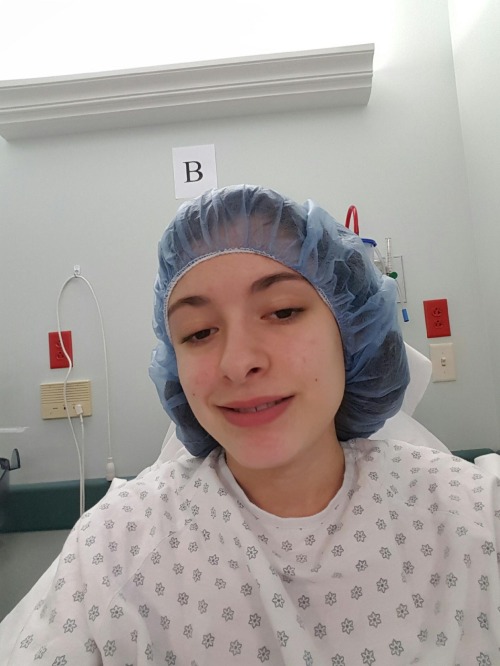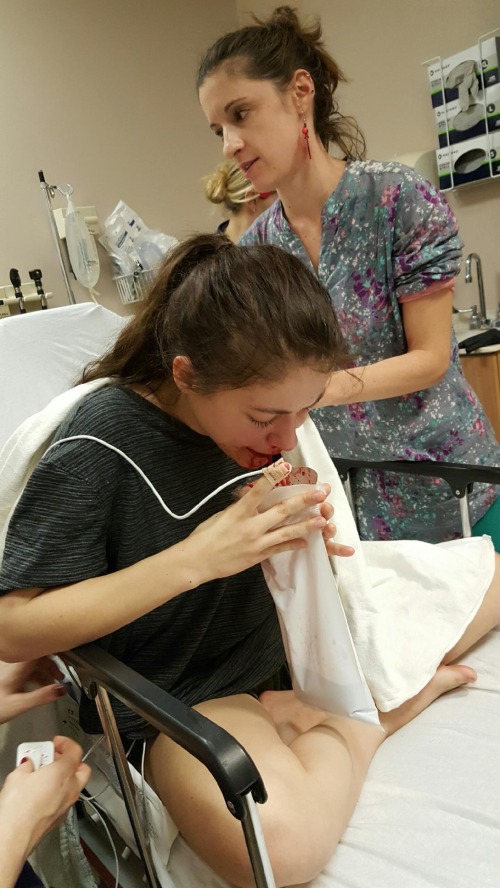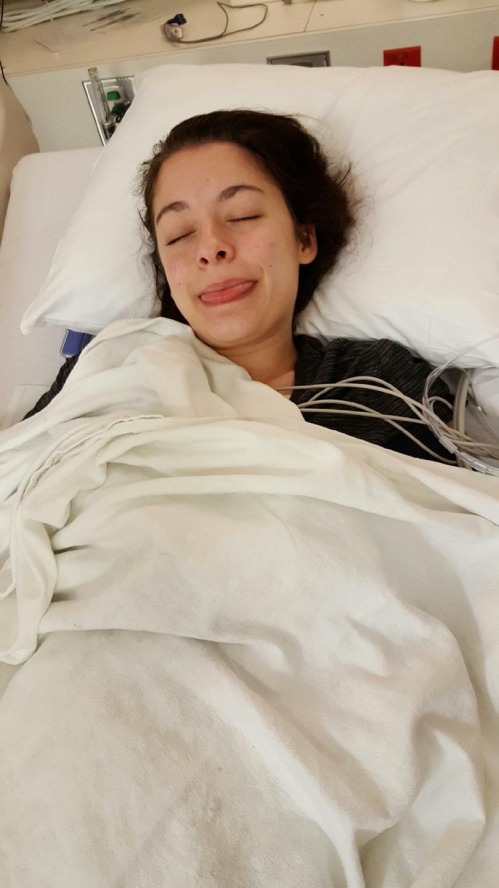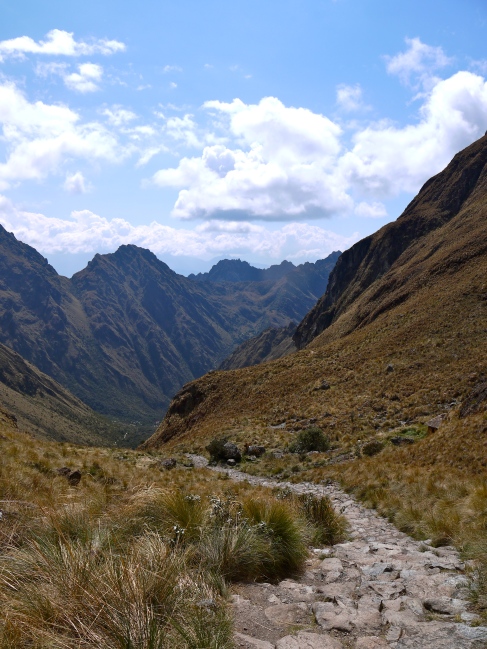On November 28th, Sara went to the hospital for a routine surgery: a tonsillectomy. As the youngest child of a surgeon, and the younger sister of siblings who had also gotten their tonsils surgically removed, Sara was well-prepared. She had been warned about the screaming sore throat and the unbearably dull soft food diet; she relished the promise of popsicles. She flashed me a mildly nervous smile on her way out, but I reassured her that we had talked through everything. She knew what to expect. We all did.

Before the original tonsillectomy surgery.
The surgery went well, and Sara’s recovery, for the first week, was smooth and unremarkable. She lost most of her scabs, graduated to more substantive foods, and was down to one final Percocet.
At eight days post-op, on December 6th, Sara made herself a bowl of angel hair pasta and sat down at the kitchen table to eat it. I had just returned from a long day of work and was sitting on a stool at the counter, decompressing and verbally sparring with my brother Rob as he scrounged up the extra pasta for his dinner. Sara had her headphones in, as she often does, and I was vaguely aware of her snapchatting with her friends in the background. She had been coughing and clearing her throat constantly over the past week as she healed from surgery, so when I heard her start up again, I thought nothing of it.
I was in the middle of laughing at something Rob had said when I heard a plaintive and quietly panicked, “Um, guys? Guys, I’m bleeding.”
I turned around on my stool to see Sara leaning over her empty dinner bowl, spitting blood out of her mouth. She had experienced some mild, completely normal post-operative bleeding when bits of her scabs had dislodged a few days prior, but this immediately looked different. Still, knowing Sara’s propensity to panic, I erred on the side of optimism. “Let me see.” I said as I settled into a seat across from her. “You’re probably just losing another big scab. Go ahead and just spit the blood out and wait for it to subside. Don’t lean back, and don’t swallow it because you’ll get sick. Just let it come. Don’t panic.”
Within a few seconds, watching the way the relentless and rhythmic way the blood would gush out every time Sara opened her mouth, I knew she needed immediate medical care. I didn’t know all the possible complications of a tonsillectomy, but I also didn’t have to be a rocket scientist to know that this wasn’t a normative part of the healing process. Something had gone terribly wrong.
“Okay, this isn’t a scab, Sara. We need to get you to a hospital where they can take care of this, okay?” I called calmly upstairs: “Mom? Call an ambulance, please. Sara’s bleeding.”
Mom walked over to the top of the stairs. “She’s what? She’s bleeding? Why don’t I just drive her to the emergency room?”
My mind was racing. I didn’t have time to communicate that we had no way of controlling this bleed, that Sara would need to be monitored and have an IV started in transit, so the next words that came out of my mouth were just, “MOM. CALL A FUCKING AMBULANCE.”
Sara immediately began to cry. “Am I going to die?”
“Absolutely not. Don’t be ridiculous.” I leaned across the table and took both of her hands in mine. “Someone at the hospital will cauterize this or get it stitched up and you will be FINE.”
“Do you promise?”
“I swear to God, Sara. You will be fine. But I need to you do something for me, okay? I need you stay with me, here. Stay focused. If you panic, or if you cry, you’ll make the bleeding worse. Breathe with me. Follow my breaths. Can you do that?”
She nodded. Rob came over and rubbed her shoulders, assuring her that this wasn’t serious, and that she would have to lose “wayyyyy” more blood than that in order to bleed out. Even though this was an obvious complication, we were both confident that it would be fixed quickly and easily.
Mom paced in the background, speaking to the 911 operator. I overheard some of the operator’s questions, obviously trying to determine the severity of the bleeding and any interventions already attempted. I’m sure the operator probably assumed this was some kind of normal post-operative bleed, and no one had used the word “hemorrhaging” yet around Sara. “Mom. Mom!” I interrupted. “Just tell them your daughter was an EMT, we have an uncontrolled bleed, and they need to dispatch an ambulance immediately.”
During the next few minutes (few million years), as we waited for the ambulance to arrive, Sara continued to hemorrhage, the bright red blood pooling in the white of her empty dinner bowl. I continued to hold her hands in mine, murmuring repeated reassurances and injunctions to “breathe,” “stay with me,” and “try to stay calm.” She wept silently, squeezing my hands and working hard to stave off a panic attack as the blood continued to pulse through her. A cop that had been dispatched arrived first, and, after seeing Sara, stood in the front door to signal the ambulance to the right house with his flashlight. By the time the medic burst through our front door, Sara’s dinner bowl was full of her blood.
The medic looked briefly at her throat (because, protocol) and immediately called it as transport to Bryn Mawr.
“Follow us in the car, Mom!” I remember yelling over my shoulder as I rushed Sara out to the ambulance. She was in her pjs. I was in my stocking feet. Neither of us had coats, shoes, phones, or wallets. It was raining.
En route to the hospital, Sara continued to bleed relentlessly. I rode in the back of the rig with the medic, Yochim, who was able to stabilize Sara’s blood pressure and respiratory rate, and get an injection port established for an IV. We assured her that she was in a controlled environment and was being well cared for. Somehow, despite filling an entire bag with blood and starting in on the second during our brief transit, Sara reconnected with the inner sass and hilarity that would prove sustaining over the next hour or so in the hospital; she was making jokes, singing, and chatting up the medic. As we rolled her into the ER, she flashed peace signs to all the nurses and administrative staff and said, “Yo, what up? Just bleeding from my face. I’m hot AF.” Everyone looked VERY confused at first, but quickly fell in love with her obvious positivity and strength.
As Sara was wheeled into an ER room and surrounded by medical staff, I provided what intake information I could. Mom arrived a few minutes later, blessedly carrying her phone and purse. She instantly took over with the administrative side of things, providing insurance information and getting in touch with Dad and the rest of the siblings. I ran back into the room to help with Sara.
I wish the story just ended there, in the ER. I wish she had received the timely, solvent interventions I had been so sure were just around the corner. Unfortunately, the next few hours felt like a dizzying descent into hell.

At the beginning, before it got messy. I’m watching vitals. Sara filled 5-6 of these bags during her ordeal (not counting the dinner bowl).
One complicating factor was that the doctor who had conducted Sara’s tonsillectomy the week prior did not live or practice locally. Sara had gone out to our Dad’s area to have her surgery done. Obviously, a long transit under these circumstances was impossible, but because of medical protocols, no one in the ER wanted to initiate a surgical intervention without speaking with the operating physician first. He proved difficult to reach. Another complicating factor was that the local, on-call ENT doctor also proved difficult to reach; when they did finally manage to get in touch with him, they discovered that he had been sleeping. He obviously needed time to collect himself and drive to the hospital to get prepped for surgery. Unfortunately, with bleeding like Sara’s, we had precious little time to work with.
Ideally and normally, in these circumstances, a post-operative bleed would be controlled or stopped in the ER, and the patient would be stabilized before being transferred to the operating room for surgery. But the final, most problematic complication we faced was that Sara’s bleed proved resistant to every single non-surgical intervention available to us in the ER. Apparently, it’s fairly common for a small artery to be nicked but cauterized during a tonsillectomy, presenting no further complications. However, when Sara’s scarring burst, the pulsing, relentless, metronomic nature of her bleeding indicated arterial involvement. Over the next hour, we watched as every intervention, gradually increasing in intensity and urgency, failed to stymy the flow of her blood. They packed her mouth with ice. They made her gargle hydrogen peroxide. They gave her an epinephrine nebulizer. They tried to squirt a cauterizing medication directly on to her bleed through a syringe. As the situation became more urgent, the ER doctor climbed on to Sara’s bed, straddled her and attempted to manually plug the bleed with her fingers in the back of Sara’s throat. When she couldn’t reach it, she tried to MacGyver a gauze pad on the end of a tongue depressor to plug the bleed. Nothing worked.
As each of these interventions were implemented and failed to stop, control, or even remotely slow Sara’s bleeding, Mom and I watched helplessly. Sara turned green, then yellow, then ashen with a bluish pallor. She was diaphoretic. Her limbs grew cold to the touch, although she was wrapped in heated blankets. As her body fought to stop bleeding, she would develop massive clotting in her throat that cut off her oxygen supply and made it difficult for her to breathe. Every time this happened, the pressure of the arterial flow would build up behind the clot. As each clot blew, Sara would release a dizzying volume of blood, projectile spewing it (along with gastric contents, bits of soft tissue, and pasta) across her bed, the floor, and us. Her talking and crying both slowed as she weakened, because eventually even distress required energy she no longer had. She grew dizzy, clouded, less coherent. She fought so long to stay conscious, terrified that if she fainted she would choke on her own blood. As that became a losing battle and she started to slump, I held her tightly against my chest to keep her upright. “I won’t let that happen to you,” I promised. “Look, I’ve got you. You’re not going anywhere.” She grew too weak to follow commands, to open her mouth or lift her arms, so I cradled her against my chest with one arm and held the blood bag up to her face with the other. Watching her hurdle headlong toward inevitable shock, Mom and I locked eyes over the flurry, silently trying to ask the question neither of us could bear. “What if?”
“I’ve got you, I’ve got you, I’m right here and I’ve got you,” I repeated over and over, probably as much to myself as to Sara. I will never forget the feeling of holding her so tightly and still feeling her start to gradually slip away.
Meanwhile, we waited for blood… which brings me to the final complication. Sara is young and healthy, and had never had an occasion for her blood to be typed. When she first arrived in the ER, they drew blood and sent it to the lab in an attempt to determine her type in the event that she would require a blood transfusion. They were not able to type her by the time she required a transfusion, and when the transfusion was finally ordered, it was emergent.
By the time the transfusion and the on-call ENT were finally on their way, and the operating room was being prepped for emergency surgery, Sara had filled an additional four bags of blood, losing well over a visible liter with an undetermined — but probably comparable — amount lost internally. Given her significant blood loss, the ER staff struggled to find a vein for the transfusion. After four attempts, Sara, who had been quiet for some time, roused herself enough to tearfully say, “Can you please stop moving that around in my arm?”
“WE GOT IT!” I cried, as we finally saw blood in the port. “We got it. It’s okay, Sara, they got it.”
Just then, Sara started to teeter from Stage 3 into Stage 4 of hypovolemic shock. I snapped. “Can we get an ETA on that blood?!” I yelled.
The ER doctor echoed me. “Someone get me that blood, and hurry!”
Sara went into convulsions on the table and started to lose consciousness. Right as that happened, the blood finally arrived and the nurses and PA wrestled and wrung the bag to force it into her system faster.
Sara continued to bleed as they fought to replace the blood she was losing, so they started prepping her for surgery. At that point, when she was finally receiving a transfusion and heading off to surgery, my body gave out and I collapsed to the floor. The next thing I knew, I was being helped into a wheelchair and told to put my head between my knees, fighting to stay conscious. I remember Mom wanting to make sure I was alright. “I’m fine, I’ll be fine.” I said. “Go up with Sara! I’ll be right behind you.”
Mom accompanied Sara, who had regained consciousness from the blood transfusion, upstairs for pre-op. I was wheeled up to the empty, deafeningly silent Green Room to wait while Sara was in surgery. The nurse who accompanied me waited until I had a couple cups of apple juice in my system. “Would you like someone to stay with you?” He asked.
“No, really, I’m fine.” I said. “A little embarrassed, but fine. You can go back downstairs. Thank you for everything.”
“Don’t be embarrassed,” he replied. “You’ve been through a really traumatic thing. Take it easy and don’t stand up for a little while yet, okay? Good luck to you and your family. We’re all rooting for your sister.”
As soon as he left, I walked shakily to the bathroom. My ears were ringing and the room looked yellow. I stood over the sink and scrubbed my sister’s blood off my hands and arms. I couldn’t get it out from beneath my fingernails.
When I left the bathroom, my mom was in the Green Room. She told me that Sara’s surgery was considered high-risk. Sara’s blood still hadn’t been typed, so the jury was out on how her body would respond to the blood they were giving her; her bleeding still hadn’t been controlled when it was time to put her under, and that (along with the need to pump her stomach and remove all of the blood) carried with it the danger of aspiration. Mom told me, briefly, about the various waivers she had been asked to sign, and about a conversation that had transpired just before surgery.
“Am I gonna die?” Sara had asked the anesthesiologist.
“Sara, honey… this a very high risk surgery.” The anesthesiologist replied. “We’re going to do everything we can.”
Sara started crying. But then, ever the empath, she had instinctively and reflexively turned to Mom. “Mom, it’s going to be okay,” she said as they wheeled her off to the OR. “If I die, I mean. It’s going to be okay. You’re going to be okay.” Barely 17, she was making peace with the possibility of death in order to comfort her mama’s heart.
Sara would be in surgery for a bit, and we wouldn’t know anything further until the procedure was completed. Still shaking and weak, I borrowed Mom’s keys and drove home to gather an outfit for Sara, in the hope that she would pull through and need them to replace the ones cut off in surgical prep. When I got home, I filled Rob in on what had happened. He was shocked that the situation had escalated the way it did. I took to Facebook to beg for prayer, and sped back.
Back in the hospital Green Room, we started the waiting game. Mom started making phone calls. We found out that Sara made it through surgery, but that the riskiest and most complicated part was still to come. They had intubated her, and the process of removing the tube from her throat could so easily undo everything they had just done surgically. It was another full hour before we knew that she was going to be okay. During that time, Dad and Perry both showed up at the hospital. I started receiving messages from people who know and cherish Sara, offering prayers and asking how they could help. We were so carried by love in that hour.
Mom got to go see her first. When it was finally my turn, the hallways seemed interminable, as though they were morphing and stretching like the tunnels of Alice in Wonderland. It was probably the longest walk of my life. When I finally turned that corner into the post-anesthesia room and locked eyes with my tiny sister so many beds away, we both started weeping.
I took her yellowed hand in mine. “You made it.” I whispered, half-triumphant, half in awe. “I told you.”

The picture Mom sent to Abby to convince her that Sara was okay. CLASSIC.
I’ve gone back in my mind, often, to that moment. To the long, white room; to locking eyes with Sara in the distance; to the disbelief and gratitude and wonder and speechlessness that flooded all of us. I’ve been thinking, in subsequent days, a lot about resurrection. About the fact that Sara came back from the brink, unceremoniously hurtling back into the arms of a life that bolsters and breaks her by turns. For some inexplicable reason, when others are not so fortunate, Sara has life yet to live; she has things left to do, and to experience, and to become. Tuesday wasn’t the final date that will follow the dash on her headstone. She’s still in the middle, with us, and there are things that are required of her here.
There are smaller resurrection moments, like these, in all of our lives. Moments where we are knocked down, moments when we are so nearly destroyed, only to be reminded that this is not the end. Moments when we struggle up from the darkness in response to the divine voice, and hear the words that carry with them such incalculable privilege and immense responsibility:
“Arise. Take up your bed, and walk.”

